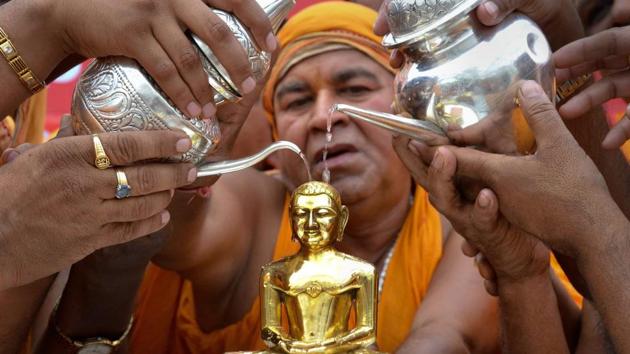The decades-old dispute over Jain guru worship
Followers of Shwetamber Tapgachha said they believe in the performance of Navangi Pooja of their living monks and observance of certain rituals, which they were prevented from doing by a temple trust run by another sect
Last week, the Bombay high court (HC) asked the state to ensure that members of a Jain sect are freely allowed to observe their religious practices in their temples.

The dispute between Jain sects in Mumbai over the right way to worship their monks is an old one and members of the community had first approached the HC with the dispute nearly two decades ago. Sects that share commons temple have been hotbeds of the dispute, with the majority group trying to enforce their beliefs on the smaller sect.
Jains have an elaborate way of honouring their 24 Tirthankars – a line of teachers/gurus of whom Mahavir, the religion’s founder who is believed to have been born in 599 BC, was the last. The images of the saints are worshipped in a ritual, called Navangi, which focuses on nine points on their body. Some members of the Shwetamber Murti Pujak Tapgachcha sect, however, also use the Navangi rituals to pay respects to living monks. This group has said that they are being prevented from practising their rituals by other sects, which prescribe ‘Ekangi’ worship, where one point of the guru’s body becomes the point of worship, for living monks.
A member of the community had told this reporter that in the 2,600 years of the Jain religion, it is only the Tirthankars who have been offered Navangi worship. “We believe that the Ekangi Pooja is for living gurus. The guru is not bigger than god.” A religious scholar said that Mahavir would not have approved of worshipping a living person in the same way as a tirthankar,” the community leader had said.
Many temple trusts in Mumbai passed resolutions banning Navangi worship of monks in their premises, displaying boards outside the shrines to warn members of other sects. In July 2000, following the decision of a Matunga temple to prohibit Navangi worship for monks, a group of devotees went to the Bombay high court, which said that stopping devotees from doing the rituals was illegal and contrary to the tenets of the religion.
In the latest dispute, followers of Shwetamber Tapgachha said they believe in the performance of Navangi Pooja of their living monks and observance of certain rituals, which they were prevented from doing by a temple trust run by another sect. They said that prohibiting and preventing of members of their sect from following the practices referred to above is a direct attack on the freedom of religion guaranteed by the Constitution of India under Article 25.
Sujay Kantawala, counsel for the Jains who filed a petition in the court, said that members of the sect are being discriminated across temples. The fundamental rights of the Jain Shwetamber Tapagachha section was violated as they were not being allowed to enter Upashrayas (residence of monks) or temples, said Kantawala.
On December 20, in an interim order, a division bench of the high court directed the state to ensure the implementation and enforcement of provisions of section 3 of the Maharashtra Hindu Places of Public Worship (Entry Authorisation) Act, 1956, which prohibits obstruction or prevention of religious services offered by any class or group of worshippers. The dispute will be next heard by the court on January 28.
Jain scholars said that a dispute over the method over worship was in variance with the Jain principle of ‘Anekant’ that asks followers to respect the views of others. Dr Bipin Doshi, who taught Jain religious philosophy at the University of Mumbai, said that rituals in the religion are ‘inspirational’ because they believe that God is not a granter of boons. “Jain philosophy is very clear: God can neither bless nor curse. Whatever happens is a result of one’s past karma and present effort. There is no divine intervention; God does not intervene and is an inspirational figure,” said Doshi who added that the Jain faith, like the Hindu religion, allowed followers to observe diverse rituals and practices. “There are no fixed rules; some groups worship idols while others do not. Nobody can say that this ritual is perfect and even meditating practices differ.”




